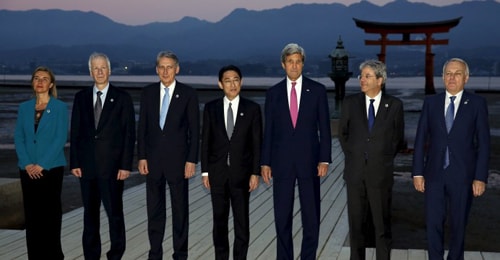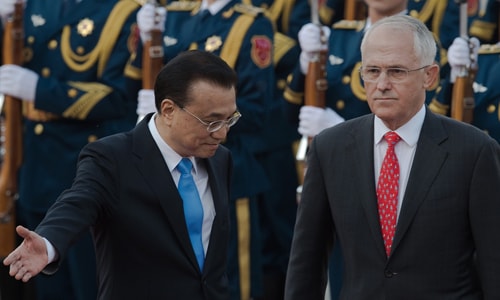China's plot to silence the world on the East Sea issue
China appears to have failed in its attempt to intimidate countries into not discussing its aggressive actions in the East Sea.
 |
G7 foreign ministers at the conference in Hiroshima, Japan. Photo: Reuters |
When Japan and the US announced that they would put the East Sea issue on the agenda of the G7 foreign ministers' meeting in Hiroshima last week, China reacted strongly, saying that the G7 should only focus on economic issues, and called Japan's move a "provocative act" with the aim of "provoking the West to suppress China," according to Reuters.
Joint statement after the conference of theG7 foreign ministers mentioned maritime security, though without directly mentioning China, stressing the "fundamental importance of the peaceful management and resolution of disputes".
After the G7 foreign ministers' statement strongly opposed any provocative or coercive actions, unilateral threats that change the status quo and increase tensions, China expressed its anger, calling these "irresponsible statements and actions".
According to commentator Frank Chin of EJInsight, China's above actions are part of an effort to "silence" the international community on the East Sea issue, especially voices opposing Beijing's illegal and arrogant moves in disputed areas with neighboring countries.
The statement issued by the G7 foreign ministers on April 11 is of great importance in terms of timing, as in just a few weeks the Permanent Court of Arbitration (PCA) will issue its verdict on the "nine-dash line" that the Philippines filed against China in the East Sea.
Beijing has defiantly declared that it will ignore the PCA's ruling, but the G7 statement called on countries to comply with international maritime law and implement any binding rulings issued by international courts and tribunals under the United Nations Convention on the Law of the Sea (UNCLOS).
Despite criticism and calls from world leaders, China continues to carry out a campaign of blockade and deterrence against any country that intends to discuss Beijing's arrogant actions in the East Sea, according to Mr. Chin.
Australian Prime Minister Malcolm Turnbull recently experienced this during his visit to Beijing on April 15-16, and just a few days later, New Zealand Prime Minister John Key. Both leaders were warned by China not to discuss the South China Sea issue or face the consequences.
According to the Sydney Morning Herald, "in an attempt to pre-empt Mr Turnbull ahead of the visit, the China Daily, the mouthpiece of the Chinese Communist Party, warned that Australia would face financial consequences if it opposed Beijing's territorial ambitions in the region."
China Daily quoted many scholars, including Han Feng, deputy director of the National Institute of International Strategy at the Chinese Academy of Social Sciences, as saying that territorial disputes in the South China Sea are not Australia's business, and Canberra's response will be "a test of the political wisdom of Australian leaders".
Deterrence fails
During a two-hour meeting with Chinese Premier Li Keqiang, Mr Turnbull reiterated his stance that anything that threatens peace and stability would be against the interests of all countries in the region. He also stated that disputes in the South China Sea should be resolved in accordance with international law.
 |
Australian Prime Minister Turnbull (right) and his Chinese counterpart Li Keqiang. Photo: HuffingtonPost |
At the banquet afterward, Chinese President Xi Jinping said China and Australia needed to respect each other’s core interests. For China, that meant Australia turning a blind eye to Beijing’s actions in the South China Sea, where it is illegally building seven artificial islands on reefs in the Spratly Islands and is in dispute with three other Southeast Asian countries: the Philippines, Malaysia and Brunei, and in the East China Sea, where China is in a dispute with Japan over the Senkaku/Diaoyu Islands.
Mr. Chin commented that as a close ally of the US, Australia will certainly not lean towards China or even keep silent because of Beijing's threats and warnings, especially if China ignores the rulings of international courts.
China’s threats to New Zealand have been more subtle than those to Australia. On the day New Zealand Prime Minister John Key arrived in China for a six-day visit, the state-run Xinhua news agency published an editorial warning Key that for the visit to be successful, he must avoid discussing the South China Sea disputes.
“The successive visits by Mr Turnbull and Mr Key,” Xinhua said, “underscore the importance of China’s growing middle class to them.” However, relations between China and New Zealand “are not always rosy,” Xinhua warned.
The news agency recalled the incident in February, when Mr. Key "made some comments against China regarding the South China Sea issue." Xinhua said those statements "went against New Zealand's commitment to not taking sides in territorial disputes in the region."
"New Zealand needs to chart its own course in relations with China rather than letting its policy be influenced by the ambitions of its military allies. The future of bilateral relations between the two countries, to some extent, depends on Wellington itself," Xinhua wrote.
"Mr. Key should remember that New Zealand is a complete bystander to the South China Sea dispute, not a party involved," Xinhua warned, adding that "any attempt by Wellington to break its promise of not taking sides on the issue will risk complicating the growing trade relationship between China and New Zealand."
According to commentator Chin, the "silencing" threats that China has just made to the G7 foreign ministers and the Australian and New Zealand prime ministers reflect the strategy of "isolating" the parties in dispute that Beijing is applying. By pushing countries like Australia and New Zealand away from the East Sea, China hopes to confront the entire international community, isolate the US and smaller countries in the region, and serve its ambition to monopolize the East Sea.
"Since China is the only country that has declared that it will ignore the international court's ruling, it is obvious that any party calling for the enforcement of the court's ruling will be seen by Beijing as criticizing its actions and showing 'bias' in the East Sea dispute," Mr. Chin emphasized.
 |
Chinese Y-8 military aircraft illegally landed on Vietnam's Fiery Cross Reef. Photo: 81.cn |
Observers say that this strategy of China cannot subdue the international community to silence its arrogant actions. On April 18, Mr. Hugo Swire, British Minister of State in charge of East Asia, stated that although relations between London and Beijing have become warmer and the UK needs to attract investment from China, the country will not stop criticizing China's unreasonable territorial ambitions in the East Sea.
"We have made it clear to China that we can only cooperate openly and transparently under the international rules-based system," Mr. Swire said. "Under this system on which the world relies, we expect the international tribunal's decision to be respected by all parties involved, and regardless of which side the decision is in, we will stand with the international community, including the United States."
According to VNE






